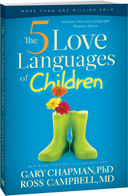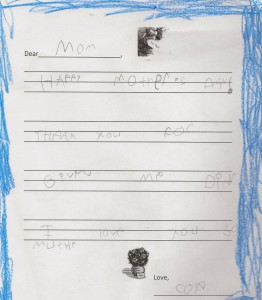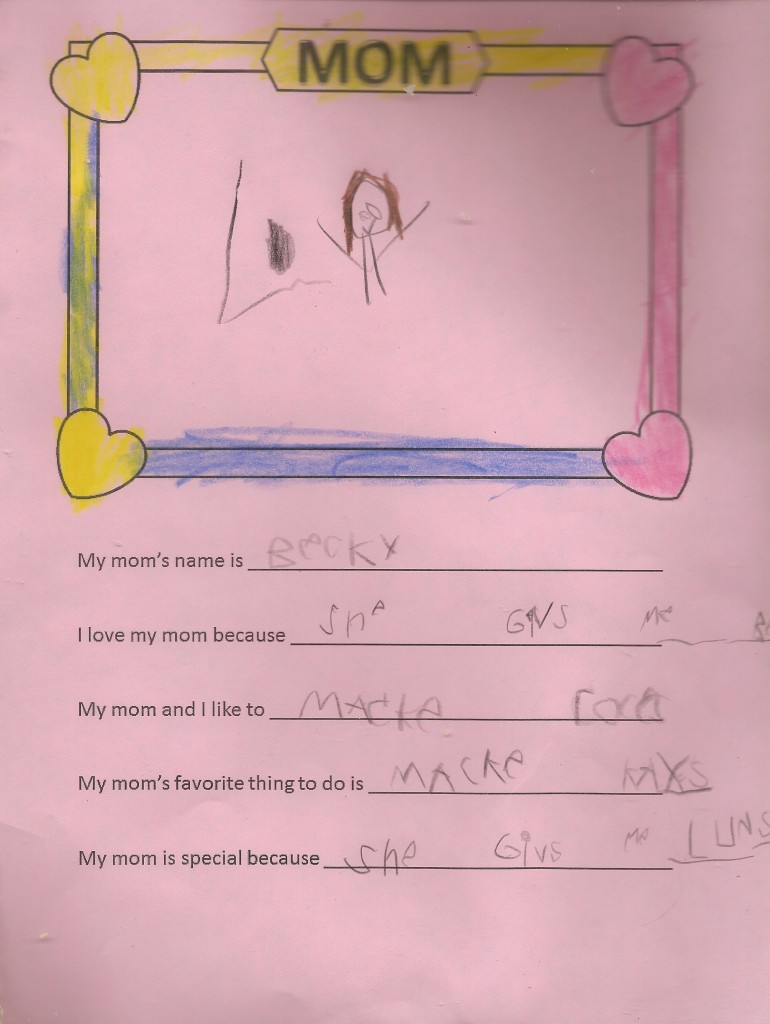“Happy Mother’s Day! Thank you for giving me dinner. I love you so much.”
“I love my mom because she gives me breakfast.”
“My mom’s favorite thing to do is make cakes.”
“My mom is special because she gives me lunch.”
As I read through the “kid writing” on my Mother’s Day letters and pictures from my 5-year-old, one thing was glaringly obvious to me. His love language is acts of service. He feels loved when I do things for him.
While thinking on that, I felt that gentle conviction of how often I complain about doing these things. Yet, these are things that makes my son feel loved. I wonder if when he hears me complaining it makes him question if I really love him. I hope not! But I suppose it is possible, if not yet then in the future… especially as he hits his teen years. If acts of service is the way he feels love and I’m acting as if doing things for him is a burden, then the message I’m sending is that I really don’t love him.
Lord, help me do all things without complaining and remember that preparing meals for my children, and baking cakes for them, and doing their laundry, and cleaning, and all of that stuff that I don’t really enjoy too much is a way to show them that I love them.
 You may have noticed me use the term “love language”. I wrote that assuming you know what I’m talking about, but I realize you may not. Gary Chapman wrote a book entitled “The 5 Love Languages”. In it he suggests that we each have a primary way that we feel loved and we show others that we love them. Quality Time, Acts of Service, Words of Affirmation, Physical Touch, and Receiving Gifts. Understanding these languages helps us to make sure we are loving people in ways that they receive it. (To go to Gary Chapman’s site to learn more about the love languages, click here.)
You may have noticed me use the term “love language”. I wrote that assuming you know what I’m talking about, but I realize you may not. Gary Chapman wrote a book entitled “The 5 Love Languages”. In it he suggests that we each have a primary way that we feel loved and we show others that we love them. Quality Time, Acts of Service, Words of Affirmation, Physical Touch, and Receiving Gifts. Understanding these languages helps us to make sure we are loving people in ways that they receive it. (To go to Gary Chapman’s site to learn more about the love languages, click here.)
For example, my husband’s language is words of affirmation. Mine is physical touch. One day we were driving in the car and he was pouring out his heart to me about something that was upsetting him. The whole time I sat there rubbing his knee. For me, a person who gives and receives love most through physical touch, I was saying, “I hear you, I love you, I care about you, I’m here” by rubbing his knee. But he is a words person. And finally he said, “Here I am pouring my heart out to you and you don’t say anything. Don’t you care?” He didn’t “hear” the love in my touch, he needed to actually hear my words. At that point, I didn’t yet understand the love languages so I had no idea why he was so upset. But since learning about them, I try to use more words and my husband tries to rest his hand on my arm or something like that more.
As parents, it’s important to understand our children’s love language. I remember a friend growing up talking about her dad. She had a new watch that we were admiring. Her dad had given it to her the day before and it wasn’t even her birthday. We told her how cool the watch was and how lucky she was. She responded by saying how she would rather spend time with her dad then get gifts from him. I don’t know why that stuck out to me, but it did. Later when I learned about the love languages, I thought back to that conversation and wondered if her dad’s love language was gifts and hers was quality time. If so, he wasn’t speaking her language and she didn’t feel loved.
I wasn’t sure what my middle son’s love language was. So I asked him when he felt the most loved: when we played together, when I did things for him, when we were snuggling on the couch, when I told him, or when I gave him things. He responded that he felt most loved when I gave him things. His love language is gifts. As I looked back, it made sense. He’s the one that would get excited when I came home from a consignment sale with a bag full of new clothes for him. He felt loved.
I think my oldest son’s is physical touch. Even though he’s 11, he still loves for us to lay down in bed with him, he still likes to hold my hand, he asks for us to squeeze him, he likes to have his back rubbed.
As a mom, the difficult thing for me in raising them up is how to balance speaking their love language with helping them grow up. If my youngest feels loved when I do things for him, then I need to be careful that when I’m encouraging him to do things on his own, that he’s not “hearing” me say, “Do it yourself because I don’t love you.” If my middle son feels loved when I give him things, then I need to be careful that when I say no to things he knows it’s not because I don’t love him. If my oldest son feels loved through touch, then I need to make sure I’m still hugging him and rubbing his back, things that seem to naturally become less as children grow older.
Lord, help me to speak my children’s language…
Do you know your child’s love language? Are you speaking it?
♥Becki

